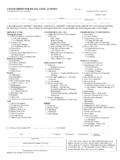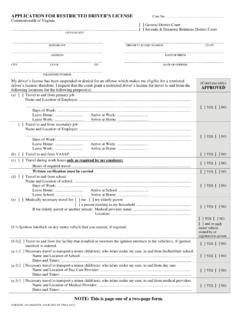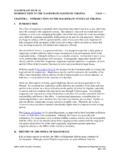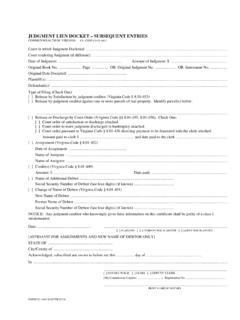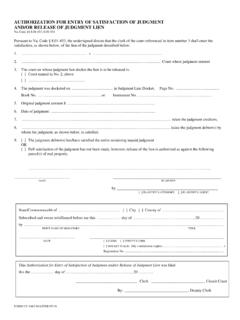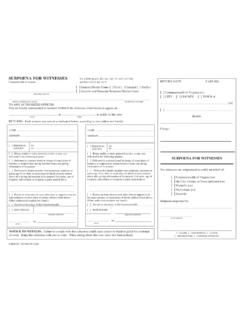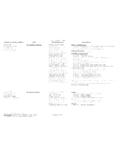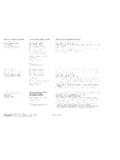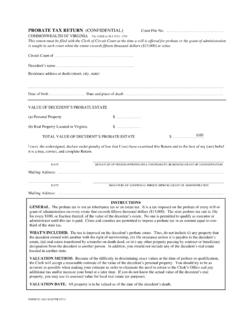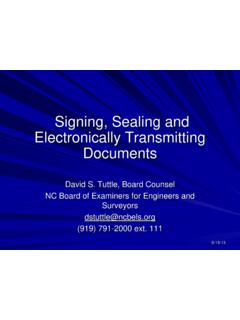Transcription of Circuit Criminal Manual - Chapter 7 - Miscellaneous Matters
1 Circuit COURT CLERKS Manual - Criminal Miscellaneous Matters PAGE 7-1 Office of the Executive Secretary Department of Judicial Services Rev: 7/18 Chapter 7 - Miscellaneous Matters I. SEARCH WARRANTS The Code of Virginia provides for the issuance of search warrants upon a sworn complaint supported by an affidavit. A search warrant may be issued by any judge, magistrate, or other person having authority to issue Criminal warrants if the complaint and affidavit show probable cause for the issuance of such search warrant. Va. Code Although clerks are authorized to issue search warrants, the clerk should not do so without having had thorough training in making probable cause determinations and in issuing search warrants. Magistrates issue almost all search warrants in Virginia. Every search warrant shall be directed to (i) the sheriff, sergeant, or any policeman of the county, city or town in which the place to be searched is located, (ii) any law-enforcement officer or agent employed by the Commonwealth and vested with the powers of sheriffs and police, or (iii) jointly to any such sheriff, sergeant, policeman or law-enforcement officer or agent and an agent, special agent or officer of the Federal Bureau of Investigation, the Bureau of Alcohol, Tobacco, Firearms and Explosives of the United States Treasury, the United States Naval Criminal Investigative Service, the United States Department of Homeland Security, any inspector, law-enforcement official or police personnel of the United States Postal Inspection Service, or the Drug Enforcement Administration.
2 The warrant shall (i) name the affiant, (ii) recite the offense in relation to which the search is to be made, (iii) name or describe the place to be searched, (iv) describe the property or person to be searched for, and (v) recite that the magistrate has found probable cause to believe that the property or person constitutes evidence of a crime (identified in the warrant) or tends to show that a person (named or described therein) has committed or is committing a crime. Va. Code The clerk's role with respect to processing search warrants is generally to serve as a repository for documents related to search warrants. Specific duties are set out below: Step 1 Clerk maintains a file for receiving affidavits for search warrants. The affidavit upon which a search warrant may be issued is not placed in a case file. Comments: An affidavit may be made by voice or videotape recording.
3 Va. Code Such affidavits are open to inspection by the public after the warrant that is the subject of the affidavit has been executed or 15 days after issuance of the warrant, whichever is earlier. Any affidavit, warrant, return, and any order sealing the affidavit, warrant, or return, may be temporarily sealed for a specific period of time. Va. Code Step 2 Clerk maintains an index for the affidavits that is kept separate from other indexes. Circuit COURT CLERKS Manual - Criminal Miscellaneous Matters PAGE 7-2 Office of the Executive Secretary Department of Judicial Services Rev: 7/18 Step 2 (cont d) Comments: The same index is used for executed search warrants that are filed with the affidavits on which they are based. Va. Code Step 3 The affidavit is filed by a judicial officer authorized to issue search warrants. It may be delivered in person or mailed by certified mail, return receipt requested or delivered by electronically transmitted facsimile process, or by use of filing and security procedures for transmitting signed documents, to the clerks office of the county or city wherein the search is made.
4 Comments: Affidavits may be filed by a judicial officer other than the judicial officer who issued the search warrant. NOTE: The copy of the affidavit is to be filed by the judicial officer as well. Step 4 The officer, or his designee or agent, may file the warrant, inventory, and accompanying affidavit by delivering them in person, or by mailing them certified mail, return receipt requested, or delivering them by electronically transmitted facsimile process, to the city/county where the search was conducted. Comments: The officer who seizes property pursuant to a warrant must make an inventory of the items seized under oath. An inventory of any seized property shall be produced before the Circuit court of the county or city where the search was conducted. Va. Code Step 5 The clerk stores property seized pursuant to warrant only if directed by the judge.
5 Va. Code Comments: See Pre-Trial - Receipt, Maintenance And Storage Of Evidence regarding the storage of property brought into the clerk's office. NOTE: See Post Sentencing Chapter (Va. Code ) regarding destruction of unexecuted search warrants and affidavits for unexecuted search warrants. NOTE: Virginia Code allows an investigative or law-enforcement officer to obtain real-time location data without a warrant in certain circumstances. No later than three business days after seeking disclosure of real-time location data pursuant to this subsection, the investigative or law-enforcement officer seeking the information shall file with the appropriate court a written statement setting forth the facts giving rise to the emergency and the facts as to why the person whose real-time location data was sought is believed to be important in addressing the emergency.
6 This written statement of facts may or may not be followed up by a search warrant. Consideration should be given as to withholding the statement for the 15 days as required for an affidavit, or until a search warrant is received. Circuit COURT CLERKS Manual - Criminal Miscellaneous Matters PAGE 7-3 Office of the Executive Secretary Department of Judicial Services Rev: 7/18 II. SEARCH WARRANTS FOR A TRACKING DEVICE A law-enforcement officer may apply for a search warrant from a judicial officer to permit the use of a tracking device. Each application for a search warrant authorizing the use of a tracking device shall be made in writing, upon oath or affirmation, to a judicial officer for the Circuit in which the tracking device is to be installed, or where there is probable cause to believe the offense for which the tracking device is sought has been committed, is being committed, or will be committed.
7 The affidavit shall be certified by the judicial officer who issues the search warrant and shall be delivered to and preserved as a record by the clerk of the Circuit court of the county or city where there is probable cause to believe the offense for which the tracking device has been sought has been committed, is being committed, or will be committed. The affidavit shall be delivered by the judicial officer in person; mailed by certified mail, return receipt requested; or delivered by electronically transmitted facsimile process or by use of filing and security procedures as defined in the Uniform Electronic Transactions Act ( et seq.) for transmitting signed documents. By operation of law, the affidavit, search warrant, return, and any other related materials or pleadings shall be sealed. Upon motion of the Commonwealth or the owner or possessor of the vehicle, container, item, or object that was tracked, the Circuit court may unseal such documents if it appears that the unsealing is consistent with the ends of justice or is necessary to reasonably inform such person of the nature of the evidence to be presented against him or to adequately prepare for his defense.
8 The Circuit court may, for good cause shown, grant one or more extensions, not to exceed 30 days each. Within 10 days after the use of the tracking device has ended, the executed search warrant shall be returned to the Circuit court of the county or city where there is probable cause to believe the offense for which the tracking device has been sought has been committed, is being committed, or will be committed, as designated in the search warrant, where it shall be preserved as a record by the clerk of the Circuit court. The disclosure or publication, without authorization of a Circuit court, by a court officer, law-enforcement officer, or other person responsible for the administration of this section of the existence of a search warrant issued pursuant to this section, application for such search warrant, any affidavit filed in support of such warrant, or any return or data obtained as a result of such search warrant that is sealed by operation of law is punishable as a Class 1 misdemeanor.
9 The affidavit, search warrant, return and other related materials or pleadings shall be sealed. It is recommended that these documents should not be indexed the Circuit Case Management System, nor should they be imaged. A separate log should be maintained, and staff access to the log and documents should be limited. Circuit COURT CLERKS Manual - Criminal Miscellaneous Matters PAGE 7-4 Office of the Executive Secretary Department of Judicial Services Rev: 7/18 III. PEN REGISTER/WIRE TRAP Pen register means a device which records or decodes electronic or other impulses that identify the numbers dialed or otherwise transmitted on the telephone line to which such device is attached. Installation or use of a pen register or a trap and trace device requires a court order under Va. Code with certain exceptions. Any person who knowingly violates this section shall be guilty of a Class 1 misdemeanor (see Va.)
10 Code for punishment). A court order is not needed however for any device used by a provider or customer of a wire or electronic communication service for billing, or recording as an incident to billing, for communications services provided by such provider or any device used by a provider or customer of a wire communication service for cost accounting or other like purposes in the ordinary course of the provider's or customer's business. Court orders authorizing the installation and use of a pen register or a trap and trace device will be valid for a period not to exceed sixty days. Once the sixty days has expired, the applicant may apply to the court for an extension. All extensions granted by the court shall not exceed sixty days. The clerk should note that it is not required to set up a separate case; however a separate filing area should be maintained.
